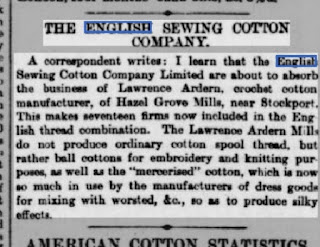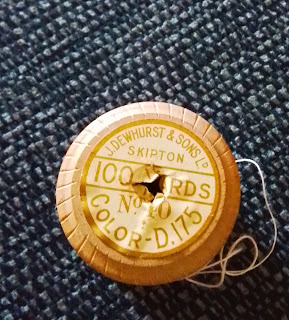The ESCC in 1963
In May 1963, ICI (Imperial Chemical Industries Ltd) took out a full page advertisement in The Scotsman newspaper. An extract of this wordy piece setting out the marvellous progress of the company goes as follows:
"Our relations with the Directors of Courtaulds are good. You will also have noticed that our joint company, British Nylon Spinners, has continued to make good progress. Jointly with Courtaulds, we have decided to assist in the development of the textile business of English Sewing Cotton Company Ltd, as a step towards the better organisation and technical progress of the textile industry. If, by the assistance which we can give, financially, technically and commercially, we can help that industry to compete effectively with foreign producers, we are likely to have a better market for our own materials."
Elsewhere in the press that month, it was reported that both ICI and Courtaulds had jointly put £10 million into the ESCC, just prior to the merger with Tootal. This gave them a 12.5% share in the ESCC. It was quoted that ICI and Courtaulds were putting up the money
"In the belief that larger and better integrated groupings are essential for the orderly development of the textile industry."
There are large sums of money being bandied about, and the talk is all of integration and development. But I think that the writing is on the wall for the ESCC at this point, I don't think that when the combine was set up, they thought they would ever be in a position where mergers and investments from the likes of Courtaulds and later Coats (merged with)Viyella would be seen as necessary in order to remain competitive. I believe that 1963 was the beginning of the end for ESCC. While all this was taking place, Top Shop, synonymous with fast fashion, was getting ready to open its first outlet in Sheffield the following year. Mary Quant was in her pomp, designing fun garments aimed at transitory teenage tastes. ICI mentions the need to compete with foreign producers. The landscape familiar to us now, where short lived garments are whipped up in China and shipped over to our High Street chains, was starting to take hold. There isn't much of a place for home sewing goods or garments produced in this country anymore.




Comments
Post a Comment